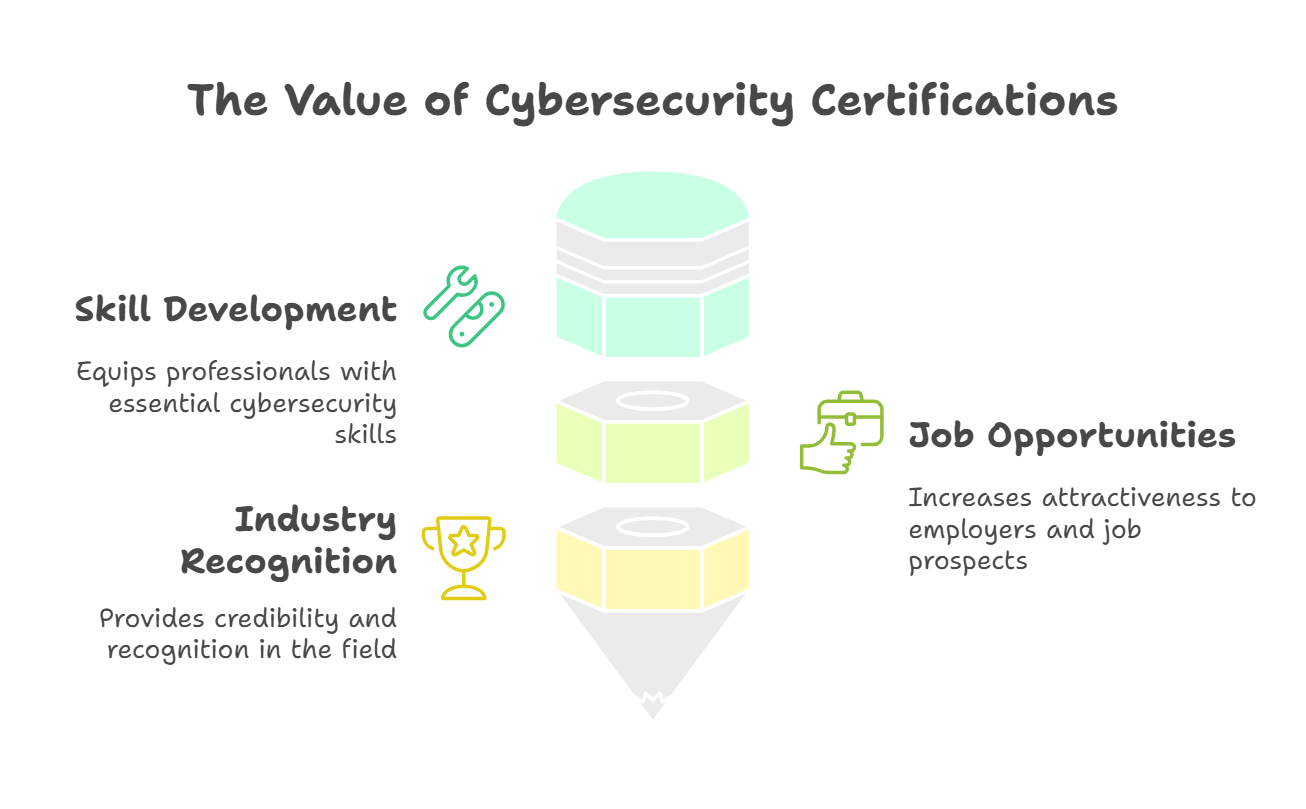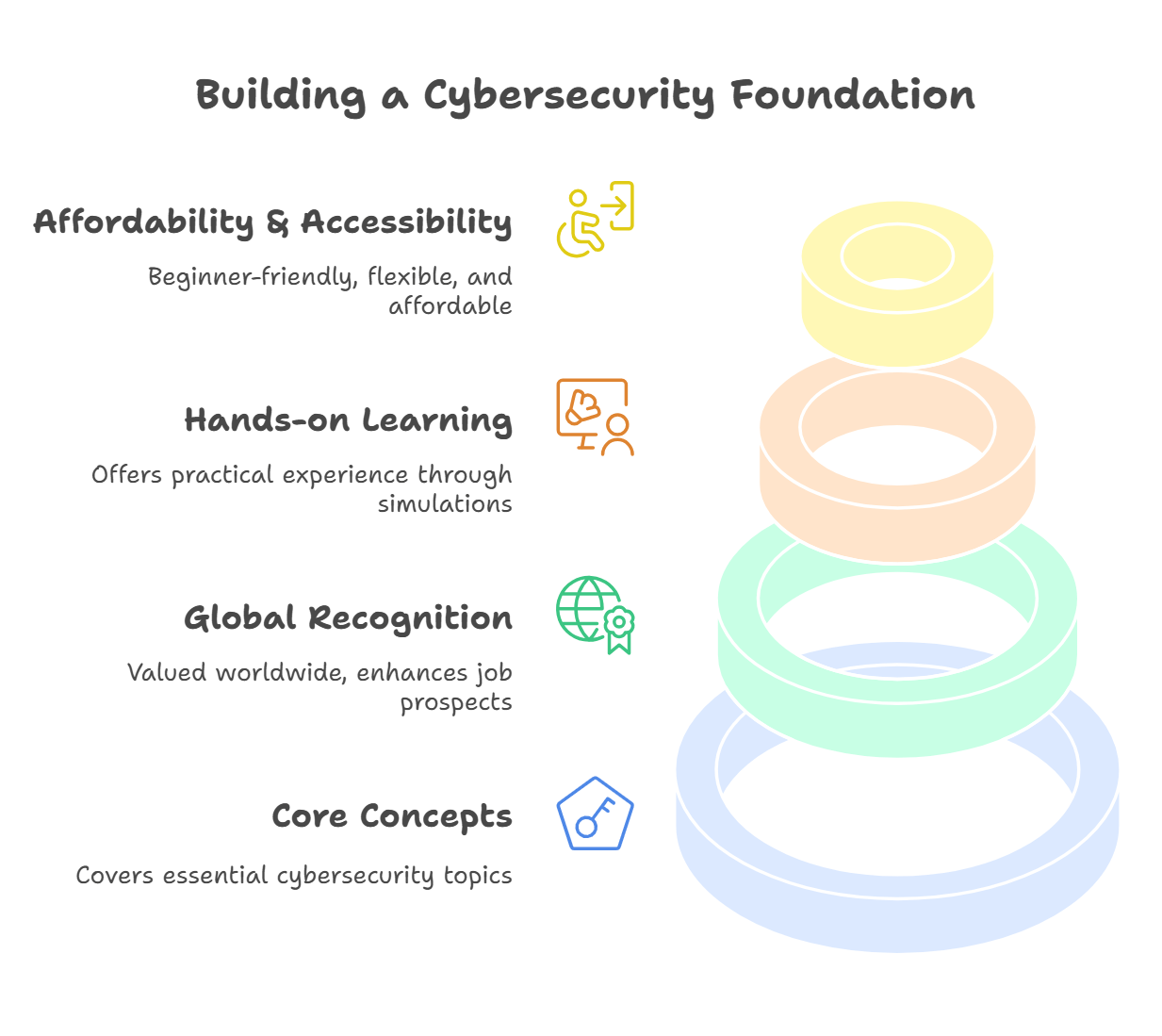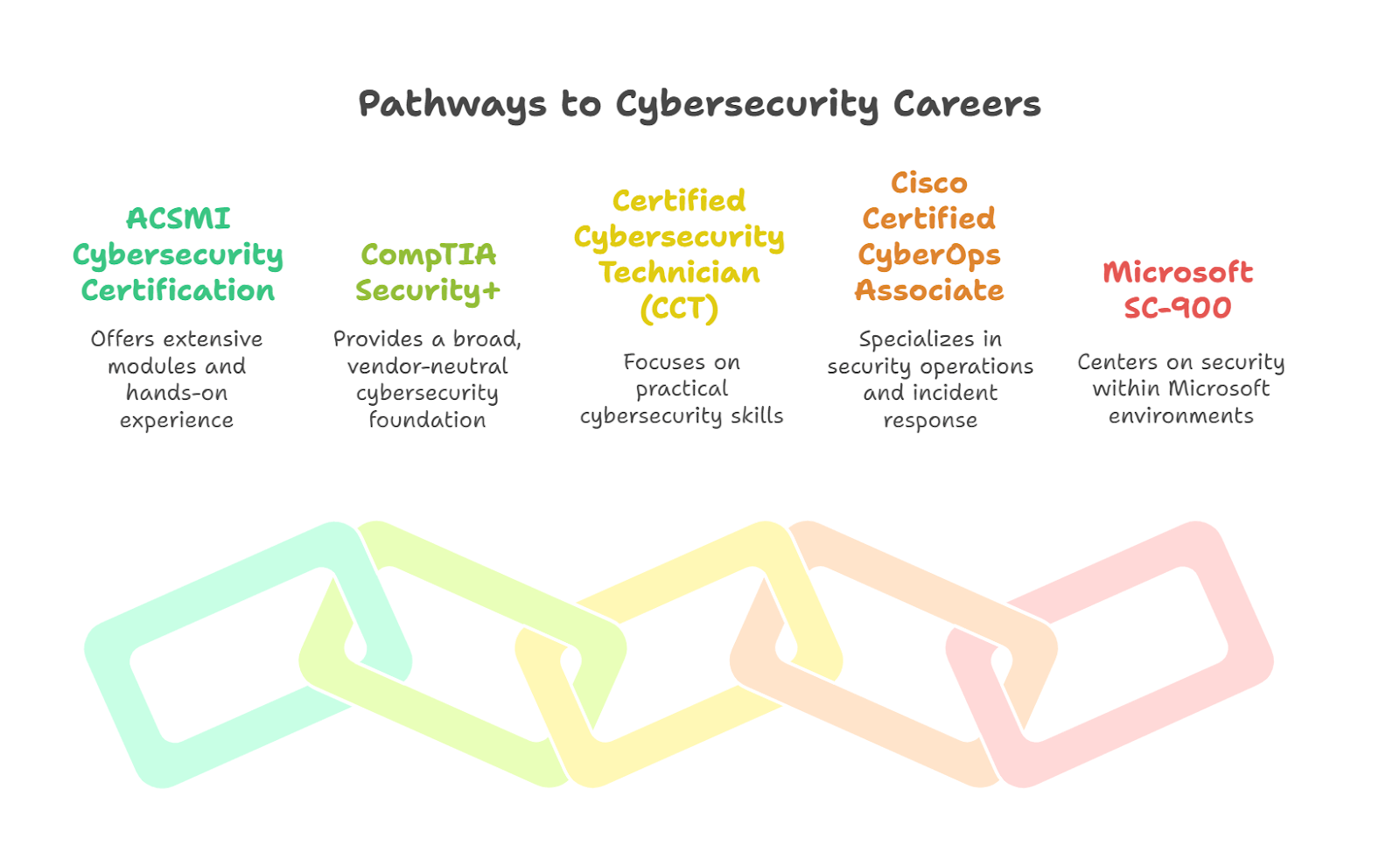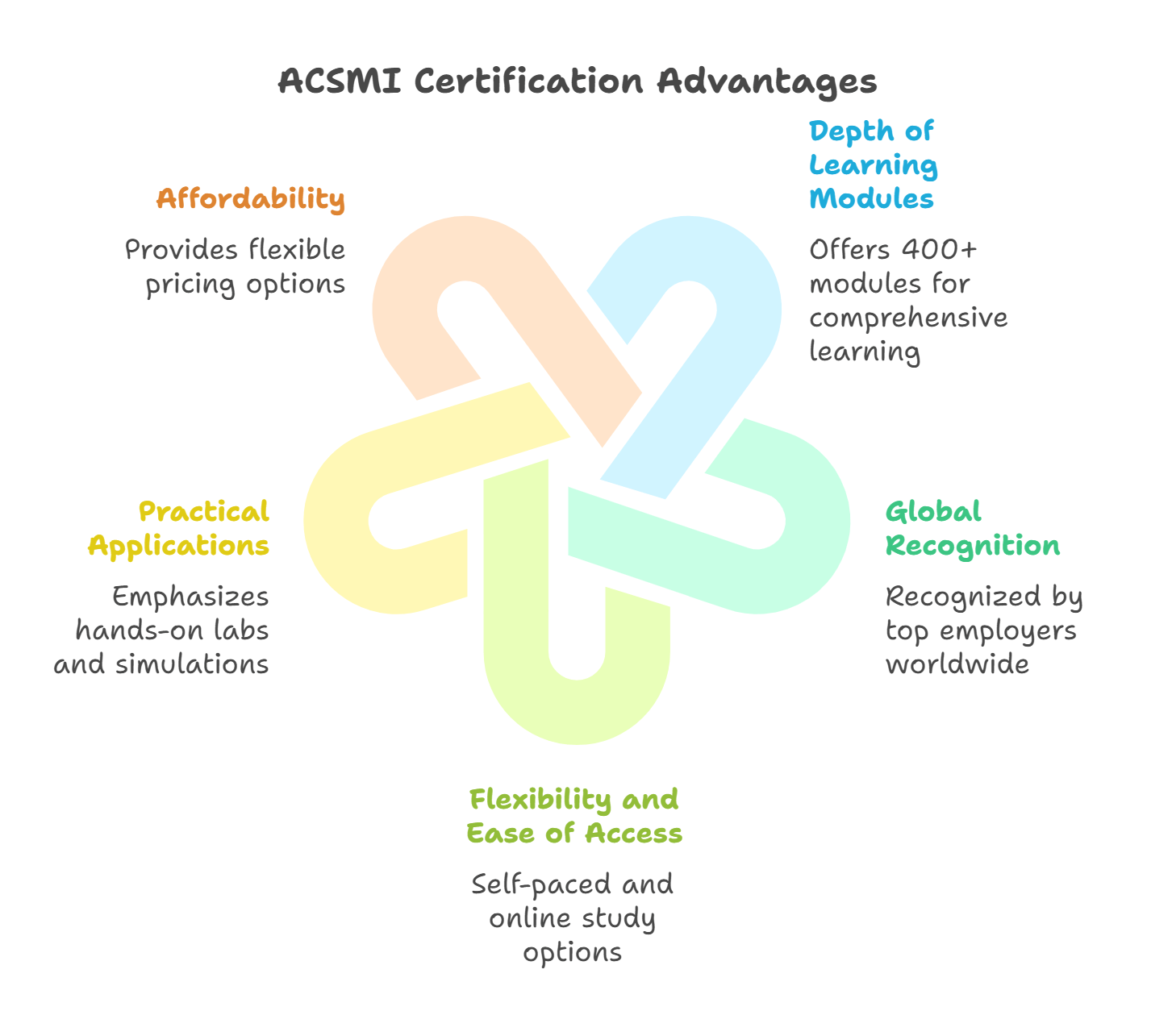Table of Contents
- Why Do You Need a Cybersecurity Certification?
- 1. Build Essential Skills
- 2. Increase Job Opportunities
- 3. Industry Recognition
- What Makes the “Best Entry-Level Cybersecurity Certification”?
- Top Entry-Level Cybersecurity Certifications in 2025
- Why ACSMI Holds an Edge Over Competitors
- How to Choose the Right Certification for You
- Pro-Tips for Passing Your Certification Exam
- Final Thoughts
- FAQs About Cybersecurity Certifications
In today’s digital world, cybersecurity is no longer an optional career field—it’s a necessity. As cyber threats increase exponentially, businesses, government agencies, and individuals are looking for qualified professionals to protect their sensitive data and IT systems. This high demand has made cybersecurity one of the most rewarding and rapidly growing industries.
If you’re considering a career in cybersecurity, the best way to stand out is by earning a certification. Specifically, entry-level cybersecurity certifications provide a strong foundation, offering you the tools and knowledge to begin your career. Among these, Google Cybersecurity Certification Price is an important factor to consider when choosing the right program. This comprehensive guide will explore why you need a cybersecurity certification, what to look for in the best entry-level programs, and highlight top certifications for 2025 that can launch your cybersecurity career.
Why Do You Need a Cybersecurity Certification?
As the global economy increasingly depends on digital technologies, cybersecurity professionals are in high demand. A cybersecurity certification is not only a way to validate your skills but also a gateway to high-paying roles and career growth. Here’s why you need an entry-level cybersecurity certification:

1. Build Essential Skills
Cybersecurity certifications are designed to equip you with the fundamental skills you need to succeed in the industry. You’ll learn network security, incident response, threat analysis, and data protection. These topics are foundational to every cybersecurity role and will give you the tools to handle the most pressing challenges in the field.
2. Increase Job Opportunities
With more organizations moving their operations online, the need for cybersecurity professionals has skyrocketed. A cybersecurity certification makes you more attractive to employers by demonstrating that you are committed to the field and have the knowledge needed to get started. Many entry-level roles in cybersecurity require certifications like CompTIA Security+ or ACSMI to even be considered.
3. Industry Recognition
Employers use certifications to assess whether a candidate meets the industry standards for cybersecurity roles. Certifications like CISSP or CompTIA Security+ are widely recognized in the cybersecurity industry, making them essential for those looking to work with leading organizations worldwide. Earning these credentials establishes credibility and helps you stand out among other candidates.
What Makes the “Best Entry-Level Cybersecurity Certification”?
When evaluating an entry-level certification, you should look for several key factors that will ensure the certification offers value and practicality:

1. Comprehensive Coverage of Core Concepts
The best entry-level cybersecurity certification programs cover essential cybersecurity topics like network security, risk management, cryptography, and threat detection. These certifications will lay the foundation for more advanced certifications later on, and they ensure that you have the skills to tackle real-world challenges in cybersecurity.
2. Global Recognition
A good certification should be recognized globally. This ensures that the skills and knowledge you acquire are valued across the industry and increases your job prospects. Certifications like ACSMI, CISSP, and CompTIA Security+ are trusted by employers worldwide and are a mark of excellence in the field.
3. Hands-on Learning Opportunities
Theory alone won’t prepare you for a career in cybersecurity. The best certification programs offer practical experience through labs, simulations, and real-world projects that allow you to apply the knowledge you’ve learned in a controlled environment.
4. Affordable and Accessible for Beginners
As you enter the field, affordability is important. The best certifications provide beginner-friendly material that’s easy to understand without overwhelming you with technical jargon. Furthermore, programs like ACSMI allow flexible learning at an affordable price point, making it accessible to anyone looking to break into the field.
Top Entry-Level Cybersecurity Certifications in 2025
Choosing the right entry-level certification is crucial for getting started in cybersecurity. Below are some of the top certifications for 2025 that will help you gain the necessary knowledge and experience to launch your career in this dynamic field, including Cybersecurity Certification Philippines.

1. ACSMI Cybersecurity Certification
The ACSMI certification is a game-changer in the cybersecurity world. This certification offers 400+ modules that provide in-depth coverage of foundational and advanced topics in cybersecurity. Whether you’re just starting or have some background knowledge, ACSMI tailors its learning path to fit your needs.
-
Key Features:
-
Comprehensive coverage of core cybersecurity concepts.
-
Modular learning system for flexibility, enabling you to learn at your own pace.
-
Real-world labs and simulations to provide hands-on experience.
-
Globally recognized by top cybersecurity employers.
-
Career Prospects: The ACSMI certification prepares you for a wide range of roles, from SOC analysts to ethical hackers, with an earning potential between $120,000 and $200,000 annually, depending on experience.
-
2. CompTIA Security+
CompTIA Security+ is one of the most widely recognized and respected entry-level certifications. It covers core cybersecurity principles, including network security, risk management, and data protection. Security+ is vendor-neutral, making it a great option for those who want a broad understanding of cybersecurity that isn’t tied to a specific platform.
-
Key Features:
-
Vendor-neutral certification that opens doors to various industries.
-
Covers key areas like network security, risk management, cryptography, and more.
-
Ideal for individuals looking to build a solid foundation in cybersecurity.
-
Salary Prospects: Individuals with CompTIA Security+ typically earn $65,000 to $85,000 annually.
-
3. Certified Cybersecurity Technician (CCT)
CCT, offered by (ISC)², is designed for those who want hands-on experience in cybersecurity. It’s a great entry-level certification that focuses on practical skills and real-world applications.
-
Key Features:
-
Offers practical exposure to network defense and troubleshooting.
-
Excellent for those who want to focus on hands-on security work.
-
Salary Prospects: CCT-certified professionals earn around $70,000 to $90,000 annually.
-
4. Cisco Certified CyberOps Associate
For those interested in operations and monitoring, the Cisco Certified CyberOps Associate certification is ideal. This certification focuses on network security, cyber defense, and incident response.
-
Key Features:
-
Tailored for individuals looking to specialize in Security Operations Centers (SOC).
-
Covers topics such as network defense, cyber threats, and incident response.
-
Salary Prospects: Cisco-certified professionals earn between $80,000 to $100,000 per year, depending on location and experience.
-
5. Microsoft Security, Compliance, and Identity Fundamentals (SC-900)
For those transitioning from a Microsoft-centric tech environment, the Microsoft SC-900 is an excellent certification. It focuses on core concepts such as security, compliance, and identity management within Microsoft environments.
-
Key Features:
-
Provides foundational knowledge specific to Microsoft’s security, compliance, and identity products.
-
Ideal for those already familiar with Microsoft tools and looking to specialize in cybersecurity.
-
Salary Prospects: SC-900 holders can expect salaries ranging from $60,000 to $85,000 annually.
-
Why ACSMI Holds an Edge Over Competitors
Among the certifications mentioned, ACSMI stands out as the best entry-level cybersecurity certification for 2025. Here’s why:

1. Depth of Learning Modules
With 400+ modules, ACSMI offers unparalleled depth in both foundational and advanced topics. This allows beginners to start at the ground level and move on to more specialized areas once the basics are mastered.
2. Global Recognition
ACSMI is recognized by top employers and is accepted globally, which boosts your chances of securing a job in cybersecurity, both locally and internationally.
3. Flexibility and Ease of Access
The self-paced, online nature of ACSMI’s certification allows you to study whenever and wherever you like. You’re not restricted by time or location, making it an excellent option for those with busy schedules.
4. Practical, Real-World Applications
ACSMI’s certification emphasizes hands-on labs and real-world simulations to ensure that you can apply what you learn in actual cybersecurity environments.
5. Affordable and Accessible
ACSMI offers flexible pricing options, making its certification accessible to those looking to invest in their career development without breaking the bank.
How to Choose the Right Certification for You
Choosing the best entry-level cybersecurity certification depends on your career goals, prior experience, and personal preferences. Here are a few questions to help guide your decision:
-
What role am I aiming for? (e.g., SOC analyst, ethical hacker, or security architect)
-
Does the certification align with industry trends? (e.g., blockchain, cloud security, IoT security)
-
Will it provide hands-on experience to develop practical skills?
-
What is my budget, and does the certification offer value for its cost?
By answering these questions, you’ll be able to make an informed decision about which certification best suits your goals.
Pro-Tips for Passing Your Certification Exam
Successfully earning your certification takes preparation, focus, and a structured study plan. Here are a few tips to help you pass your certification exam with flying colors:
-
Stick to a Study Plan: Break your study sessions into manageable chunks, and set clear deadlines to stay on track.
-
Use Practice Exams: Take mock exams to familiarize yourself with the test format and pinpoint knowledge gaps.
-
Join Study Groups: Connecting with others pursuing the same certification can enhance your understanding and provide useful insights.
-
Leverage Labs: Many certifications, like ACSMI, offer practical labs that allow you to test your skills in real-world environments.
Final Thoughts
Embarking on a cybersecurity career begins with choosing the best entry-level certification. Whether you’re aiming for CompTIA Security+, ACSMI, or another certification, it’s important to ensure it aligns with your goals and offers hands-on, real-world learning experiences. The cybersecurity industry is booming, and the right certification will set the foundation for a successful career in this dynamic field.
Start your journey today, and invest in a cybersecurity certification that will prepare you for long-term success.
FAQs About Cybersecurity Certifications
Q1. What is the best entry-level cybersecurity certification for beginners?
The ACSMI certification is one of the top-rated options, offering extensive content, hands-on training, and global recognition. Other contenders include CompTIA Security+ and (ISC)² Certified Cybersecurity Technician.
Q2. How much can I earn with an entry-level cybersecurity certification?
On average, entry-level cybersecurity professionals earn between $60,000 to $80,000 annually. Certified individuals may have a higher earning potential depending on their role and location.
Q3. Do I need a degree to work in cybersecurity?
No, a degree is not mandatory. Many employers value certifications and practical experience over formal education. The best entry-level cybersecurity certification can substitute for a degree in many cases.
Q4. How long does it take to earn a certification?
Most entry-level certifications take between 1 to 6 months to complete, depending on the program. ACSMI Certification offers modular courses for flexible learning at your own pace.

Leave a Reply